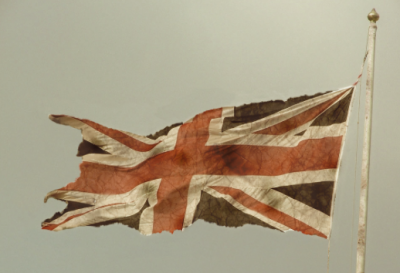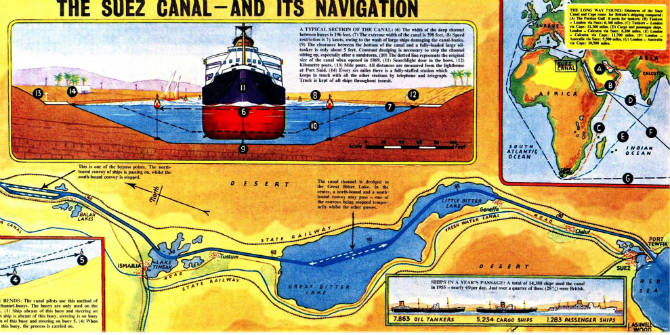Ten Acts of Gross British Misgovernment Since 1945

As the UK leaves the European Union, Philip Allott (University of Cambridge) reflects on ten occasions when Britain has badly misjudged and mishandled challenges to its hegemony – both internal and external – and traces the cause to the dominance of the executive branch.
An alternative British political history since 1945 could focus on a remarkable series of failures by British governments which have seriously damaged the country. We who have lived through them have tended to regard them as natural and inevitable. They are not.
National humiliation … Suez. A cutaway from The Eagle magazine, November 1956. Image: ausdew. Public domain
Unusually, it is possible to identify the probable cause. After World War One, the executive branch of government found that it had acquired a de facto dominance over the House of Commons, which thereafter became its poodle. Lord Hewart called it ‘the new despotism’ (1929). Lord Hailsham called it ‘elective dictatorship’ (1976).
Liberal democracy, as practice and philosophy, is Britain’s greatest achievement. It is the fruit of a continuous process of constitutional evolution from Anglo-Saxon times, as the country adapted, to use the Darwinian word, to our ever-changing circumstances with an almost miraculous intuitive intelligence. We have not made the mistake made by so many other countries of adopting a written constitution, transient selfie of the distribution of power at the time when it is written. It is time for us to adapt yet again, before it is too late.
It was inevitable that India would become independent soon after World War Two. It was not inevitable that it would do so in a state of chaos whose effects are felt to the present day.
It was inevitable that we would give up our empire, under the pressure not least of the insidious populist doctrine of self-determination preached by a self-interested United States. It was not inevitable that we should do so in such haste in countries often lacking the most basic structures of modern society.
It was inevitable that President Nasser of Egypt would take control of the Suez Canal. It was not inevitable that our government would cause it to be a national humiliation affecting every aspect of our foreign policy for years to come.
It was inevitable that the United States would take over from us as a global imperial power. It was not inevitable that it would do so on such terms as those dictated by the US at Bretton Woods, or that our government would believe the illusion that the ruthless government of the United States is our special friend.
It was inevitable that the war-torn nations of Europe would create a new basis of their co-existence other than diplomacy and war. It was not inevitable that we would join the new European system late, without any enthusiasm and without any plan for playing our part. At that time we had what were probably the best civil service and diplomatic service in the world. We might have played a leading role.
Gross British misgovernment and disdain of Ireland over the course of centuries had made some sort of Irish independence inevitable. Ireland has always been, since earliest times, a source of cultural and personal enrichment for Britain. It was not inevitable that a form of agreement would only be found after years of violence and suffering.
It was inevitable that, sooner or later, we would have to modernise our position in relation to the smaller Arab states bordering the Persian Gulf. It was not inevitable that in 1971 the government would abandon a great achievement of British diplomacy, dating from 1820, leaving the fabulous wealth of the area to the reconstituted states and to global oil and gas corporations.
It was inevitable that, after the collapse of the Soviet empire in Eastern Europe, a new structure would be created for their relationship with the new Europe. To this day, it is not clear why the government took the lead in a policy of more or less immediate full membership for the ex-Soviet states, leaving the suspicion that they had the vague idea that it would dilute the coherence of the EU of which the UK itself, with amazing tolerance on the part of the other member states, had already made itself into a semi-detached member.
It was inevitable that age-old sentiment in Scotland about its place in the United Kingdom would have to be faced by the British government. It was not inevitable that this would be done in a referendum which did not seek the opinion of the whole population of the United Kingdom. Scotland has contributed an enormous amount to the history, the culture, the social order and the economy of this country, and to the making and managing of the Empire. It was not inevitable but scandalous that its future and the future of the United Kingdom would be made to rest on such a one-off ‘in or out’ basis.
It was inevitable that government would have to respond to gathering opposition to British membership of the European Union. It was a legitimate political decision to consult the British people and to decide to implement the outcome of a referendum. It was not inevitable that implementing those decisions would be carried out in political and diplomatic chaos, profoundly unsettling the future of the country for many years to come.
The remedy for all this misgovernment must be found in restoring the dialectical secret at the heart of Britain’s unique form of liberal democracy, in which government and opposition struggle vigorously and co-operate effectively in the task of good government, with everyday public opinion and occasional general elections always having the last word.
*
Note to readers: please click the share buttons above or below. Forward this article to your email lists. Crosspost on your blog site, internet forums. etc.
Philip Allott is Professor Emeritus of International Public Law at Cambridge University, a Fellow of Trinity College, and a Fellow of the British Academy. He was at one time a legal adviser in the Foreign and Commonwealth Office.


